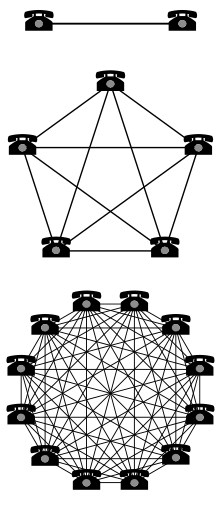Network effect is a significant concept in economics and business. It refers to the phenomenon where the value or utility a user derives from a good or service increases as the number of users grows. It’s a crucial factor in the success of many companies, including major tech firms like Amazon, Google[2]e Facebook[1]. Network effects can dramatically enhance a product or service’s functionality, as seen in platforms like Spotify[3] and Dropbox. They can lead to increased adoption rates, competitive dynamics, and even market dominance. However, network effects also present challenges such as potential negative impacts and antitrust issues. Understanding and strategically harnessing network effects can result in rapid company growth and strong market positioning.
In economics, a network effect (also called network externality ou demand-side economies of scale) is the phenomenon by which the value ou utility a user derives from a good ou service depends on the number of users of compatible products. Network effects are typically positive feedback systems, resulting in users deriving more and more value from a product as more users join the same network. The adoption of a product by an additional user can be broken into two effects: an increase in the value to all other users (total effect) and also the enhancement of other non-users' motivation for using the product (marginal effect).

Network effects can be direct or indirect. Direct network effects arise when a given user's utility increases with the number of other users of the same product or technology, meaning that adoption of a product by different users is complementary. This effect is separate from effects related to price, such as a benefit to existing users resulting from price decreases as more users join. Direct network effects can be seen with serviços de redes sociais, including Twitter, Facebook, Airbnb, Ubere LinkedIn; telecommunications devices like the telephone; and mensagens instantâneas services such as MSN, AIM ou QQ. Indirect (or cross-group) network effects arise when there are "at least two different customer groups that are interdependent, and the utility of at least one group grows as the other group(s) grow". For example, hardware may become more valuable to consumers with the growth of compatible software.
Network effects are commonly mistaken for economies of scale, which describe decreasing average production costs in relation to the total volume of units produced. Economies of scale are a common phenomenon in traditional industries such as manufacturing, whereas network effects are most prevalent in new economy industries, particularly information and communication technologies. Network effects are the demand side counterpart of economies of scale, as they function by increasing a customer's willingness to pay due rather than decreasing the supplier's average cost.
Upon reaching critical mass, a bandwagon effect can result. As the network continues to become more valuable with each new adopter, more people are incentivised to adopt, resulting in a positive feedback loop. Multiple equilibria and a market monopólio are two key potential outcomes in markets that exhibit network effects. Consumer expectations are key in determining which outcomes will result.